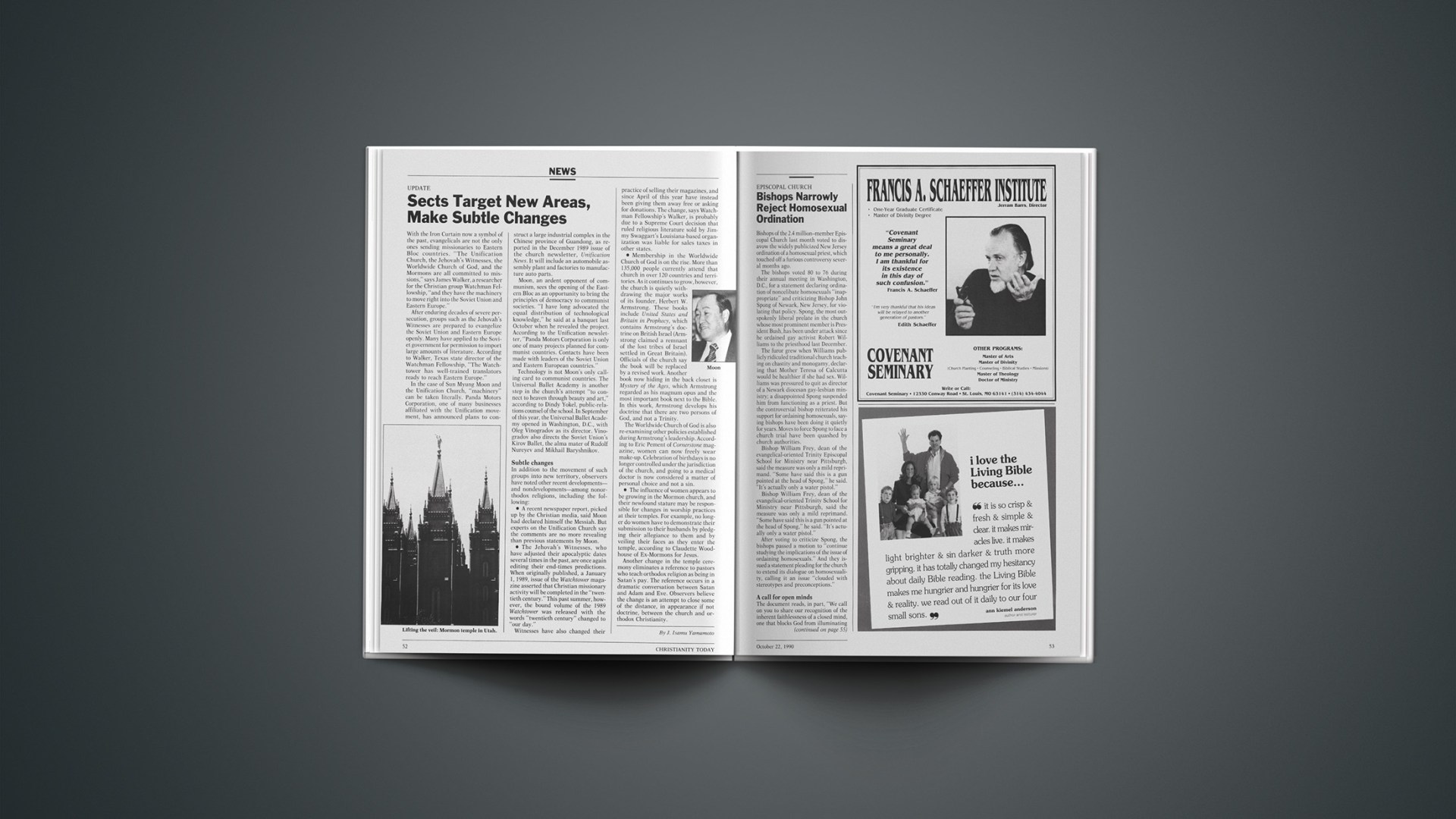With the Iron Curtain now a symbol of the past, evangelicals are not the only ones sending missionaries to Eastern Bloc countries. “The Unification Church, the Jehovah’s Witnesses, the Worldwide Church of God, and the Mormons are all committed to missions,” says James Walker, a researcher for the Christian group Watchman Fellowship, “and they have the machinery to move right into the Soviet Union and Eastern Europe.”
After enduring decades of severe persecution, groups such as the Jehovah’s Witnesses are prepared to evangelize the Soviet Union and Eastern Europe openly. Many have applied to the Soviet government for permission to import large amounts of literature. According to Walker, Texas state director of the Watchman Fellowship, “The Watchtower has well-trained translators ready to reach Eastern Europe.”
In the case of Sun Myung Moon and the Unification Church, “machinery” can be taken literally. Panda Motors Corporation, one of many businesses affiliated with the Unification movement, has announced plans to construct a large industrial complex in the Chinese province of Guandong, as reported in the December 1989 issue of the church newsletter, Unification News. It will include an automobile assembly plant and factories to manufacture auto parts.
Moon, an ardent opponent of communism, sees the opening of the Eastern Bloc as an opportunity to bring the principles of democracy to communist societies. “I have long advocated the equal distribution of technological knowledge,” he said at a banquet last October when he revealed the project. According to the Unification newsletter, “Panda Motors Corporation is only one of many projects planned for communist countries. Contacts have been made with leaders of the Soviet Union and Eastern European countries.”
Technology is not Moon’s only calling card to communist countries. The Universal Ballet Academy is another step in the church’s attempt “to connect to heaven through beauty and art,” according to Dindy Yokel, public-relations counsel of the school. In September of this year, the Universal Ballet Academy opened in Washington, D.C., with Oleg Vinogradov as its director. Vinogradov also directs the Soviet Union’s Kirov Ballet, the alma mater of Rudolf Nureyev and Mikhail Baryshnikov.
Subtle Changes
In addition to the movement of such groups into new territory, observers have noted other recent developments—and nondevelopments—among nonorthodox religions, including the following:
• A recent newspaper report, picked up by the Christian media, said Moon had declared himself the Messiah. But experts on the Unification Church say the comments are no more revealing than previous statements by Moon.
• The Jehovah’s Witnesses, who have adjusted their apocalyptic dates several times in the past, are once again editing their end-times predictions. When originally published, a January 1, 1989, issue of the Watchtower magazine asserted that Christian missionary activity will be completed in the “twentieth century.” This past summer, however, the bound volume of the 1989 Watchtower was released with the words “twentieth century” changed to “our day.”
Witnesses have also changed their practice of selling their magazines, and since April of this year have instead been giving them away free or asking for donations. The change, says Watchman Fellowship’s Walker, is probably due to a Supreme Court decision that ruled religious literature sold by Jimmy Swaggart’s Louisiana-based organization was liable for sales taxes in other states.
• Membership in the Worldwide Church of God is on the rise. More than 135,000 people currently attend that church in over 120 countries and territories. As it continues to grow, however, the church is quietly withdrawing the major works of its founder, Herbert W. Armstrong. These books include United States and Britain in Prophecy, which contains Armstrong’s doctrine on British Israel (Armstrong claimed a remnant of the lost tribes of Israel settled in Great Britain). Officials of the church say the book will be replaced by a revised work. Another book now hiding in the back closet is Mystery of the Ages, which Armstrong regarded as his magnum opus and the most important book next to the Bible. In this work, Armstrong develops his doctrine that there are two persons of God, and not a Trinity.
The Worldwide Church of God is also re-examining other policies established during Armstrong’s leadership. According to Eric Pement of Cornerstone magazine, women can now freely wear make-up. Celebration of birthdays is no longer controlled under the jurisdiction of the church, and going to a medical doctor is now considered a matter of personal choice and not a sin.
• The influence of women appears to be growing in the Mormon church, and their newfound stature may be responsible for changes in worship practices at their temples. For example, no longer do women have to demonstrate their submission to their husbands by pledging their allegiance to them and by veiling their faces as they enter the temple, according to Claudette Wood-house of Ex-Mormons for Jesus.
Another change in the temple ceremony eliminates a reference to pastors who teach orthodox religion as being in Satan’s pay. The reference occurs in a dramatic conversation between Satan and Adam and Eve. Observers believe the change is an attempt to close some of the distance, in appearance if not doctrine, between the church and orthodox Christianity.










